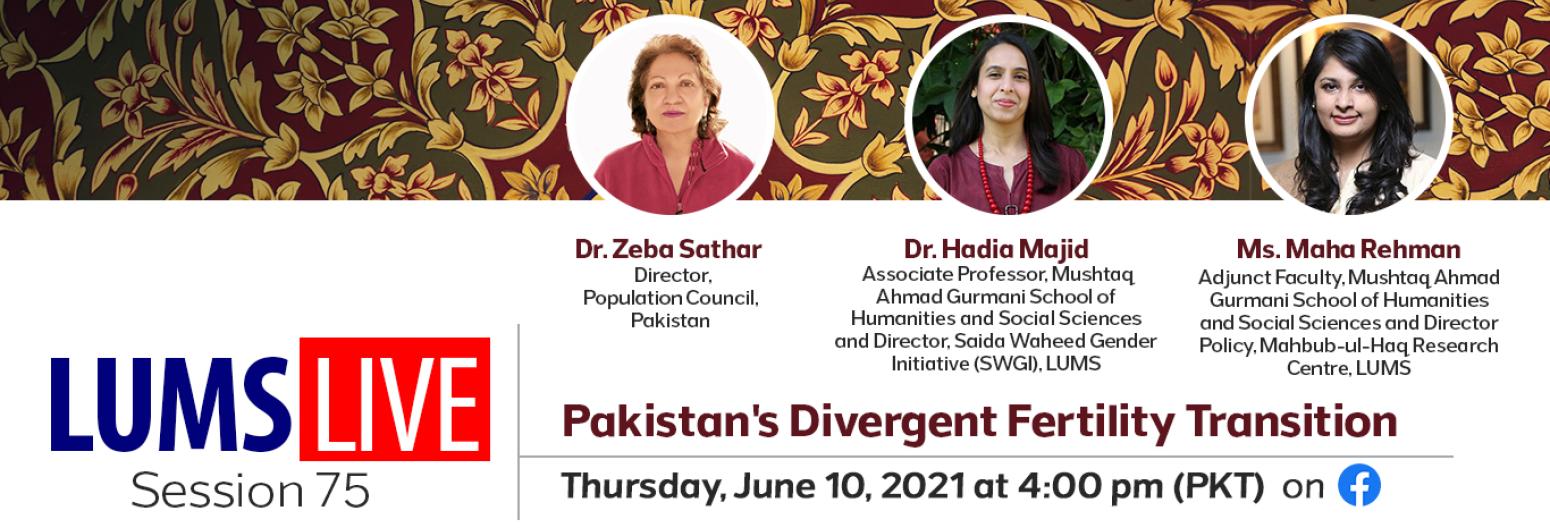
June 10, 2021
Dr. Zeba Sathar, Director of Population Council, Pakistan, will be examining the divergence in Pakistan’s fertility transition from other countries in South Asia. She will examine the causes that explain this divergence and its implications for citizen welfare. Hosted in collaboration with the Mahbub ul Haq Research Centre as part of their Mahbub ul Haq Distinguished Lectures 2021, the session will be moderated by Dr. Hadia Majid and Ms. Maha Rehman.
Date: Thursday, June 10, 2021
Time: 4:00 pm (PKT)
Join us on Facebook Live for this interesting conversation!
Profiles of Panelists
Dr. Zeba Sathar
Dr. Sathar is a leading demographer working on South Asia. Her research interests include demographics, gender, population planning and child and maternal health. She is the editor of Fertility Transition in South Asia and has contributed to several other books such as Population Dynamics in Muslim Countries.
In 2006, Dr. Sathar received the Tamgha-i-Imtiaz from the President of Pakistan in recognition of her public service to the development sector in Pakistan. She is also the first Pakistani to be elected to the governing council of the International Union for the Scientific Study of Population, and was the co-lead of FP2020’s Performance, Monitoring and Accountability working group. Sathar is a lead author on the Population Council’s publication Capturing the Demographic Dividend in Pakistan, an evaluation of population trends, challenges in achieving demographic change, and policies for capturing the demographic dividend in Pakistan.
Dr. Sathar has a PhD in Medical Demography from the London School of Hygiene and Tropical Medicine, an MSc in Demography from the London School of Economics and BA in Economics from Wellesley College. She frequently publishes articles on gender and equality, safe abortion and post-abortion care, maternal and child health, and family planning, and presents her research at national and international scientific conferences.
Dr. Hadia Majid
A Fulbright Scholar, Dr. Majid holds a PhD in Development Economics from Ohio State University. Her research agenda considers the impact of monetary and public resource constraints on individuals in Pakistan. Her work includes cash transfer evaluations, public goods provisioning, human capital acquisition in the context of intra-household decision-making, and factors affecting women’s access to earned income. Here, she documents and explores the barriers to women’s labour supply and their access to decent, empowering work with a special emphasis on the role of household bargaining structures in mediating women’s access to work. Her expertise lies in RCT, quasi-experimental, and quantitative driven fieldwork. She has also done qualitative work with low-literate, low-income informal and formal sector women workers.
Ms. Maha Rehman
Ms. Rehman, a Data Analytics Expert, has almost a decade of experience in designing and executing evidence-based programs, products and policies to improve service delivery and impact. Previously, with the Centre for Economic Research Pakistan (CERP) Leadership Team, she set up the Analytics Wing at CERP that focused on embedding data in the decisions and operations of private and public sector companies to increase efficiency, impact and profit. Prior to this, she has led research experiments at CERP and at the World Bank in the fields of education, public finance and governance. She has designed curriculum and taught policymakers, bureaucrats and data practitioners at various programs in the USA and Pakistan. Currently, she is teaching at the LUMS Economics Department.
Besides using data analytics for policy and programme reform, her research interests include energy economics, education and law & governance. She combines her coursework in economics with her interest in entrepreneurship and is also a Pakistan Acumen Fellow, 2016. She frequently writes for DAWN and other daily publications and blogs. She completed her graduate studies in Economics from Duke University, USA and has an undergraduate degree in Economics and Mathematics from LUMS.

